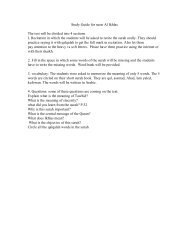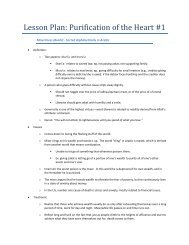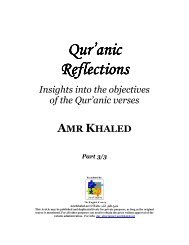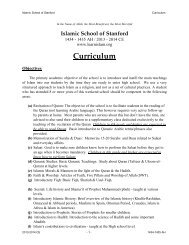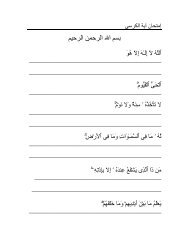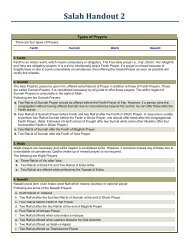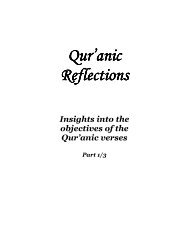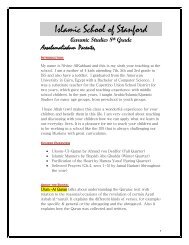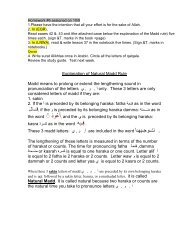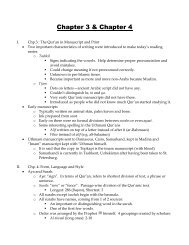Quranic Reflections - Islamic School of Stanford
Quranic Reflections - Islamic School of Stanford
Quranic Reflections - Islamic School of Stanford
You also want an ePaper? Increase the reach of your titles
YUMPU automatically turns print PDFs into web optimized ePapers that Google loves.
One may learn from Surat Al–Qasas how to trust Allah’s (SWT) promise. In the third<br />
ayah only the believers were addressed because they are the ones who believe in<br />
Allah’s (SWT) promise in what can be translated as, “We rehearse to thee some <strong>of</strong><br />
the story <strong>of</strong> Musa and Fir’aun in Truth, for people who believe” (TMQ, 28: 3).<br />
In the forth ayah we find out that Musa (AS) and the believers with him were in a<br />
difficult situation just like Prophet Muhammad (SAWS) in what can be translated as,<br />
“Truly Fir’aun elated himself in the land and broke up its people into sections,<br />
depressing a small group among them: their sons he slew, but he kept alive their<br />
females: for he was indeed a maker <strong>of</strong> mischief.” (TMQ, 28: 4).<br />
Few words portraying Pharaoh’s power and the Children’s <strong>of</strong> Israel’s weakness.<br />
However, the fifth ayah brings Allah’s (SWT) promise in what can be translated as,<br />
precaution “And We wished to be gracious to those who were being depressed on<br />
the land, to make them leaders (in faith) and make them heirs” and another<br />
greater promise <strong>of</strong> power “To establish a firm place for them in the land, and to<br />
show Fir’aun, Haman, and their hosts, at their hands, the very things against<br />
which they were wary.” (TMQ, 28: 5,6). Such was Pharaoh’s will and Allah’s<br />
(SWT) will. Will Allah’s (SWT) will come true<br />
Musa’s (AS) mother<br />
After the ayahs which portray Pharaoh’s oppression and the ayahs <strong>of</strong> Allah’s (SWT)<br />
promised victory, the seventh ayah says what can be translated as, “So We sent this<br />
inspiration to the mother <strong>of</strong> Musa: “Suckle (thy child),” (TMQ, 28: 7) as if this<br />
verse marks the beginning <strong>of</strong> promise’s fulfillment, how<br />
After referring to Pharaoh’s power and oppression and hinting at the necessity for<br />
change, the Surah moves to completely a different situation : a mother feeding her<br />
child, so what is the link This states that victory starts from mothers who feed their<br />
children, with the milk, adhering to religion and trust in Allah’s (SWT) promise.<br />
What is wonderful about such an ayah is that it did not tell Musa’s (AS) mother:<br />
(when thou hast fears about him, hide him) or (embrace him) but it said what can be<br />
translated as, “but when thou hast fears about him, cast him into the river,”<br />
(TMQ, 28: 7) it is meant to tell her ‘throw him into the river and have trust in Allah<br />
(SWT), why Because He says what can be translated as, “for We shall restore him<br />
to thee, and We shall make him one <strong>of</strong> Our Messengers.”“ (TMQ, 28: 7). It is the<br />
story a nation’s birth, which started with a child thrown into the river and a mother’s<br />
trust in Allah’s (SWT) promise.<br />
Women’s role in the defense <strong>of</strong> religion<br />
Surat Al-Qasas highlights women’s role in bringing victory to religion. The main<br />
leading figures in the Surah who helped Musa (AS) carrying out his role were four<br />
women: the first was Musa’s (AS) mother in what can be translated as, “So We sent<br />
this inspiration to the mother <strong>of</strong> Musa” (TMQ, 28: 7) who protected Musa (AS)<br />
through her behavior which resulted from her deep faith in Allah’s (SWT) promise.<br />
Then was his sister in what can be translated as, “And she said to the sister <strong>of</strong><br />
(Musa), “Follow him,” so she (the sister) watched him in the character <strong>of</strong> a<br />
stranger, and they knew not. Thus did We restore him to his mother, that her<br />
eye might be comforted, that she might not grieve, and that she might know that



